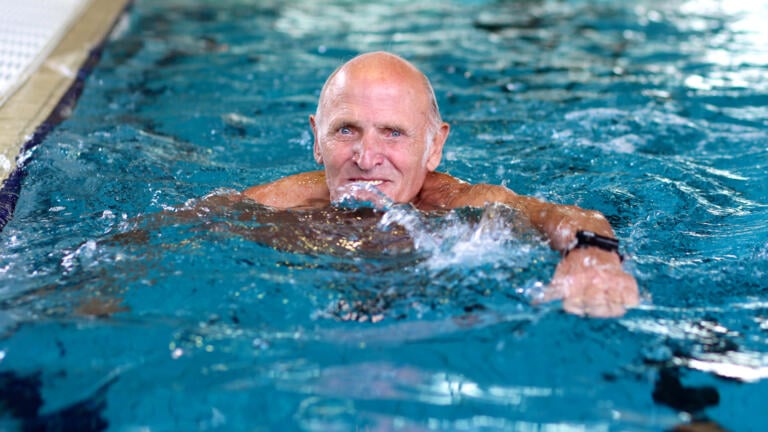
12 reasons why swimming is good for you
Julie Penfold
Why a good night’s sleep is as vital as exercise if you want to stave off dementia.
We all want to stay sharp as we get older, and the benefits of exercise for our brain health are well known. But now researchers have found that unless we are getting a decent night’s sleep, all our exercising may be in vain.
Scientists from University College London (UCL) say that sleeping for six to eight hours a night is vital to keep our brains sharp in middle age. Their research found that people in their fifties and sixties who were physically active saw a fall in their brain power if they had less than six hours of sleep a night.
So what can we do to maximise our sleep to maintain the best brain health as we age?
We all want to stay sharp as we get older, and the benefits of exercise for our brain health are well known. But now researchers have found that unless we are getting a decent night’s sleep, all our exercising may be in vain.
Scientists from University College London (UCL) say that sleeping for six to eight hours a night is vital to keep our brains sharp in middle age. Their research found that people in their fifties and sixties who were physically active saw a fall in their brain power if they had less than six hours of sleep a night.
So what can we do to maximise our sleep to maintain the best brain health as we age?
 Credit: Shutterstock/fizkes
Credit: Shutterstock/fizkesIt’s well established that exercising is linked to better brain health as we age. One of the latest studies, published this year, found that exercising just once a month can make a difference.
However, if we are in our fifties and sixties and sleep is a problem, then that all changes.
A bad night’s sleep can make us feel awful. We can’t think straight and it’s a struggle to do any exercise at all. If we do manage to lace up our trainers and get out of the front door, then although we might feel better physically, our brain won’t benefit.
The newest research by UCL, published this month, followed 9,000 people in England aged 50 and above for a decade.
Those in their fifties and sixties who did a lot of exercise but got less than six hours of sleep on average a night saw a rapid cognitive decline compared to those who were less active but had more sleep.
The report’s lead author, Dr Mikaela Bloomberg, from UCL’s Institute of Epidemiology and Health Care, says: “Our study suggests that getting sufficient sleep may be required for us to get the full cognitive benefits of physical activity. It shows how important it is to consider sleep and physical activity together when thinking about cognitive health.”
She added that her team was surprised to see “that regular physical activity may not always be sufficient to counter the long-term effects of lack of sleep on cognitive health”.
When we asked her what the best thing is that we can do to keep our brains sharp and prevent cognitive decline, she told us: “We should focus on participation in physical activity and maintaining good sleep hygiene as part of a broader healthy lifestyle.”
Sport experts agree with the findings of this latest research, saying that to keep our brain and bodies in top condition we need to exercise and to sleep well.
Professor John Brewer, visiting professor of sport and exercise science at the University of Suffolk, says: “Sleep is an essential part of the body’s recovery process and it is the time when the human body’s repairing and refuelling processes take place, preparing us both physically and mentally for the following day. The findings of this research are not surprising, since cognitive function and the performance of the brain are likely to be impaired in individuals who are sleep-deficient.
“Of course, one of the benefits of exercise is that it causes fatigue, which will in turn promote better sleep. It’s also important to remember that the quality of sleep can be as important as the quantity, and what this research has highlighted is that regular exercise, combined with sufficient sleep quantity and quality, is the best way for people of all ages to maintain their physical and mental wellbeing.”
 Credit: Shutterstock /IndianFaces
Credit: Shutterstock /IndianFacesIf you are having trouble sleeping, the last thing you want to hear is this latest news, as it will be just another worry to keep you awake at night.
So what can you do if you are caught in that vicious cycle of insomnia?
Saga Exceptional’s sleep writer Rebecca Frew says: “This research is another reason for us all to prioritise our rest and allow ourselves an early night.
“If we get a good night’s sleep, we feel better about ourselves, we are happier, and we have more energy to exercise. It’s just about making small changes to our lives to ensure we get the best night’s sleep we can.”
Frew says there are some simple steps you can take to improve sleep.
As Frew says: “These simple changes to our sleep habits, combined with exercise, can really make a difference to our cognitive health and are an easy way to help us live a better, healthier and more fulfilled life.”

Written by Phillipa Cherryson she/her
Published: Updated:
Phillipa Cherryson is a senior digital editor for Saga Exceptional. Phillipa has been a journalist for 30 years, writing for local and national newspapers, UK magazines and reporting onscreen for ITV. In her spare time she loves the outdoors and is a trainee mountain leader and Ordnance Survey Champion.